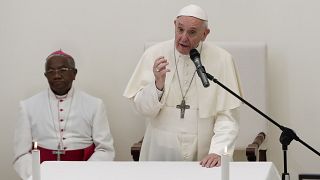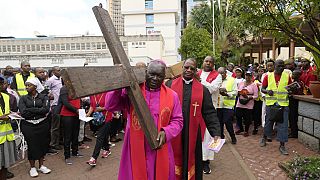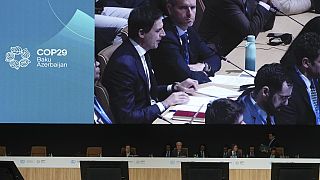Vatican
After pushback by some bishops in Africa, Poland and elsewhere, the Vatican on Thursday defended the recent move by Pope Francis to allow blessings for same-sex couples, insisting there is nothing “heretical” involved.
In a five-page statement, the Holy See’s office to safeguard doctrinal orthodoxy expressed understanding that some bishops’ conferences need more time for “pastoral reflection” on the pontiff’s formal approval for such blessings.
But “there is no room to distance ourselves doctrinally” from the Declaration about the blessings “or to consider it heretical, contrary to the Tradition of the Church or blasphemous," said the statement by the office, formally called the Dicastery for the Doctrine of the Faith.
The new rule of blessings came last month in the form of a declaration, an important Catholic church document. Some bishops immediately said they wouldn’t implement the new policy.
“Prudence and attention to the ecclesial context and to the local culture could allow for different methods of application” of the new blessings rule, “but not a total or definitive denial of this path that it proposed to priests,” Thursday’s statement said.
Still, the orthodoxy watchdog office on Thursday acknowledged that in situations where “there are laws that condemn the mere act of declaring oneself as a homosexual with prison and in some cases with torture and even death, it goes without saying that a blessing would be imprudent.” It added: ”It is clear that the Bishops do not wish to expose homosexual persons to violence.”
However, the statement called it “vital” that these bishops conferences “do not support a doctrine different from that of the Declaration signed by the pope.”
Thursday’s statement took pains to stress the Vatican’s position that “remains firm on the traditional doctrine of the Church about marriage, not allowing any type of liturgical rite or blessing similar to a liturgical rite that can create confusion.”
The pontiff’s approval reversed a 2021 policy by the Vatican’s doctrine office which barred such blessings on the grounds that God “does not and cannot bless sin.”
The Vatican holds that gay people must be treated with dignity and respect, but that gay sex is “intrinsically disordered.” Catholic teaching says that marriage is a lifelong union between a man and woman, is part of God’s plan and is intended for the sake of creating new life.
Zambia’s bishops conference said same-sex couple blessings were “not for implementation in Zambia.” The bishops conference of Malawi said “blessings of any kind” for “same-sex unions of any kind” would not be permitted.
In Zambia, gay sex is punishable by between 15 years and life in prison and the law puts it in the same section as bestiality. Malawi’s laws call for up to 14 years in prison for homosexual sex, with the option of corporal punishment for those convicted.
Zambian bishops said there should be “further reflection” on the blessings and cited the country’s laws against homosexuality and its “cultural heritage” that rejects same-sex relationships as reasons for its decision.
Francis in his papacy has made a decade-long effort to make the church a more welcoming place for the LGBTQ community. But his approach continues to spark resistance among traditionalist and conservative Catholic leaders.
Thursday’s statement stressed that the Vatican was allowing “short and simple pastoral blessings.”
“This non-ritualized form of blessing, with the simplicity and brevity of its form, does not intend to justify anything that is not morally acceptable,’’ the dicastery’s statement said.
The statement was signed off by Cardinal Victor Manuel Fernandez, an Argentine prelate who is a theological adviser to Francis.
It concluded by saying that in some places, some “catechesis will be necessary that can help everyone to understand that these types of blessings are not an endorsement of the life led by those who request them” nor an “absolution, as these gestures are far from being a sacrament or a rite.”











00:53
Pope Francis calls for empathy and justice in welcoming Migrants
01:04
Pope Francis in East Timor in first papal visit since independence
01:27
Pope Francis slams those who turn their backs on migrants, says not helping them is a 'grave sin'
Go to video
Namibian court declares laws banning gay sex unconstitutional
01:08
Pope Francis urges action to end bloodshed in the Democratic Republic of Congo
01:00
Pics of the day: June 13, 2024